The following is only intended to be a taste, not comprehensive. Some of this is because people decided to have a hissy over RFK Jr’s remarks, which I will not link here.
The issue has been that the people who are autistic who can speak for themselves, by selection effect, are going to be those who don’t have the worst issues with communication and other cognitive effects of autism.
Let me explain my own experience with my son Diarmuid, who was born in 2006, and diagnosed on the autism spectrum in 2009 (“PDD-NOS” originally — Pervasive Developmental Disorder Not Otherwise Specified — this is one of the diagnoses, like Asperger’s, that no longer officially exists).
I will share a few videos and pictures, and a few stories. I will not be sharing the really disturbing information, because it involves people other than me and Diarmuid (and Stuart), and I don’t want to embarrass anybody.
This is only intended to give people an idea what one type of autism manifests as. It’s not high-functioning, but not necessarily low-functioning, either.
People always say autism is a spectrum, but it’s more like a Rubik’s hypercube (of an undefined number of dimensions). It affects cognition and behavior, and many sensory issues.
Pre-diagnosis: He’s odd — just like us!
Stuart was an early talker. I was a late talker… and when I got around to talking, I was speaking in complete sentences, and I could communicate very well at that point, thank you. I just had nothing I wanted to say before.
Diarmuid was a bit different. He didn’t talk. He sang.
That video was from 25 Mar 2008, when D (our nickname for Diarmuid) was 22 months old.
He didn’t talk. But he sang all sorts of things… and he flapped his arms and hands (often called “stimming” - for self-stimulating - and there are other stimming behaviors)… which we didn’t realize was a common behavior among autistic kids.
No, not the “high-functioning” ASD folks. They may have some stims, but they are often less obvious, like the spinners that were a fad a few years ago.
The autistic kids who had to go to special schools like Fred S. Keller School in Yonkers had the grossly obvious ones, like dropping to the ground and sticking their heads between your knees. D used to do that a lot, and I thought that was specific to him. Then I went to the school and saw that other kids were doing that. He did that before he went to the school, as did the other kids. There were all sorts of behaviors like that.
Initially, I didn’t realize for a bit that D was put in the lowest-functional classroom… it was the nonverbal classroom, and it was all-male:
The flip side is what I saw at D's preschool, where all the students were on the autism spectrum: much more lop-sidedly male than any of the physics classes I've ever been in. D was in with the most impaired group - because he was essentially non-verbal, couldn't feed himself, and had all sorts of other developmental delays. That class started out all male, and I was later told it was the only all-male class in the school (a non-verbal girl was in the class in a later year). Some of the boys who were in that group are still non-verbal, and D's verbal abilities are very limited even now. In the special education services at his school, it's primarily boys there.
The above is from a post in 2018, when D was 12 years old.
Stu & I had to hand-feed D until we got him into the above school and they used ABA to teach D to feed himself… the baby food he still ate, long after most kids had moved onto “chewy foods”.
People often didn’t believe us that D ate only baby food, given his size, and I attribute it to Stu’s own expertise in nutrition.
I’m not going to share the other videos as embeds, but I will link them by description if you want to look at them:
D’s 3rd bday — and his reactions to presents. He’s not happy.
Stu and I trying to interact with D by singing - he’s almost 3 years old at this point - he’s not talking. We know he sings, but he never really talks
We had gotten a speech therapist when he was 3, and she told us to get him evaluated, which we did. We were paying her, but she probably noticed she was getting nowhere with D.
The thing is, I’m also selecting videos here specifically — for the ones I usually pick for family on social media, they’re going to be happy ones. Here, I’m trying to pick ones where the problems are evident.
Post-diagnosis, Fred S. Keller School
In the video below, Diarmuid is 3 years old, and the first time anybody in our family saw D feed himself. He ate only baby food at this point.
He was diagnosed PDD-NOS (as mentioned above) in the summer of 2009, after which we revisited the videos above, the notes I had been making, and all sorts of issues.
It all started making sense. And much of it was that what we thought was autism was not what autism is.
In October 2009 I wrote:
I come to praise the Fred S. Keller school
So D has been going to the Fred S. Keller school in Yonkers for about a month now.
Since going there, he has gone to feeding himself [still eating only jarred baby food/yogurt] and drinking from an open cup [and pouring it down his front deliberately] where before we could never get him to feed himself and he would only take sippy cups.
Wow, the changes have come so fast, it's so amazing.
The people at FSK use applied behavior analysis, which is a form of classical conditioning techniques. As noted in the wiki article, the effectiveness of this technique in dealing with children with autism spectrum disorders is mixed, but it has been working very well with D. As part of the parental education, we're encouraged to make our own goal that we can apply ABA to [I'm thinking brushing teeth, Stu is thinking D picking up his room so the girls don't have to do it any more.] But I'm concerned we'll have nothing to work on given how fast he's been progressing!
I was being a bit optimistic there.
The thing is, while D was diagnosed PDD-NOS [aka "hell if we know, enjoy your label"], his problems aren't that severe compared with many kids. He's very friendly and docile for the most part, is generally not afraid of strangers [or at least, women... he's such a flirt]. He seems to understand language, and tries to talk from time to time [and tries to sing ... he loves songs]. He doesn't have problem with transitions or change. He does have certain repetitive behaviors, but it's not difficult to distract him from those, and he has no self-destructive behaviors [since we've buzzed his head, he loves rubbing the fuzz. I agree, it's very calming.] His gross motor skills [when he wants to do something] are pretty good, and his fine motor skills seem pretty good to me for his age.
Well, again, I was being optimistic at this point. I didn’t know what his trajectory would be.
His language is still limited, but it has grown a lot lately — but he’s 18 years old now. I have a better idea of where it’s going to go. And it’s not normality.
It’s not “high-functioning”.
I'm hopeful that D may gain that surface normality and join the rest in the family with being marginally odd. But that may not happen. That's okay - I understand the windmills and tulips are very pretty, even if it's not the Ponte Vecchio.
I came to hate that metaphor. (It’s up there with the “spoons” metaphor for my chronic pain issues. It doesn’t work for me.)
For many reasons. When I wrote that piece, I hadn’t run into my chronic pain issue, and of course, Stu hadn’t been diagnosed with terminal cancer.
It took several years to get D fully potty-trained. I remarked at one point that if he were fully potty-trained by 18, we had succeeded. It wasn’t finished by the time he left Fred S. Keller (a preschool), but part of that was because he wasn’t eating non-baby food until he was 5 years old.
The K-12 Years (still in process)
That one is just fine but….
So, there have been many changes since the diagnosis.
For example, D no longer eats baby food, thank goodness. That would be a bit pricey for an almost 6-foot-tall man. But his diet is still very restricted. He subsists primarily on grilled cheese sandwiches, chicken nuggets, and juice. I have expanded his diet to Ritz crackers, Lorna Doone cookies (pricey!), and applesauce, but we take what we can get. Oh, and he will eat french fries.
So yay.
He attends the local school system in self-contained classrooms, with some mainstreaming as he got older. But when he leaves his special education classroom, he is attended by a 1-on-1 aide.
This is what his room looked like in 2016:
That’s from 2016. Yes, that’s the work of Sharpies on the wall. And it’s not just in his bedroom, but all over the house.
He loves alphabets, logos, icons, kana, typefaces, emojis, etc. And he loves expressing himself in such a way. Wherever he can.
Those are the walls of his bedroom. You can see where we attempted to clean the walls before. I’ve given up.
Oh, and it’s not just the walls. It’s my physical books.
That’s from just a few years ago. He writes alphabets and lists on EVERYTHING.
EVERYTHING.
You may recognize that partial list from a drop-down menu. That was written on a blank page in one of my books.
Every wall, every book, every piece of paper.
He has destroyed a lot of electronics. There are many things I will not even buy, and others I keep locked up, so that D will not destroy them. I currently don’t have a working washer, because D had messed it up from playing with the controls too many times. He broke one dishwasher (another broke a different way).
He perseverates often — that is, he gets stuck on a thought and will just keep coming back to it. Here is an example from today, when I took him and his oldest sister to lunch and then to shopping:
D: “I want Starfall ABC please” (this is one of his favorite apps on the Kindle)
D: “When is Starfall ABC”
D: “Starfall ABC AT BURGER KING”
D: “I WANT STARFALL ABC”
There are many strategies to deal with this, to distract or deflect, but they all have limited success. Today, the most successful was me writing a list on the back of an envelope from mail I had just picked up, then handed the list to D, with a pen, and I told him to put Starfall ABC on the list. I gave him an additional envelope (from junk mail) and told him he could doodle on it.
But he did keep going on about Starfall ABC. When we got to BK, Chase (his oldest sister) reminded him to get his pen and envelopes, and I further distracted him by putting a BK crown on him and there was a giant inflatable Easter Bunny inside. Then he started rocking. The sensory input kind of short-circuited the Starfall ABC litany for a while.
If you’ve ever read Harrison Bergeron, and about the characters wearing headphones to play brain-disrupting sounds periodically… well, it can be like that. My daughters have sound-cancelling headphones and earplugs, but those do only so much. I can’t wear these, because some adult needs to be aware of what he’s doing. He does not have the most settled sleep patterns — this is not the reason I wake up at ungodly hours, but it doesn’t help.
His sisters do help, but I don’t expect them to take full responsibility for him. Ultimately, I’m responsible for him. It had been both Stu and I, but well. Stu’s gone.
When he’s at school, I get respite. Alas, we had applied for support… and then the pandemic hit, and the only support being offered was virtual, which was not helpful at all. I would rather not go through that history right now.
The local school has been excellent in developing D’s capabilities. He has come a long way. But whenever he takes state tests, he scores in the lowest decile. Well, somebody has to be there, I suppose. This is why he’s in special education. He does his core academics by Direct Instruction, and he reads elementary school-level books, but his demonstrated understanding is low, partly because his communication skills are still very low.
The rest of the post will be the happy stuff.
Communication breaks through sometimes
12 years ago:
He was almost 6 at that point.
9 years ago:
D was almost 10 at that age.
Oh, right. I didn’t mention what most of his speech was like in the intervening years. It was repeating lines from SpongeBob SquarePants or Dora the Explorer or movies he knew. Unfortunately, I didn’t know what movies or shows he had seen, as he watched things at school or while I was at work. Sometimes I could figure it out from context.
His actual communication has often been “scripting”, which is to take pre-scripted sentences and slotting in words. “May I have juice, please?” “May I have Kindle, please?” “No, thank you” It is a very restrictive area. It is mostly requests.
When he got into joking, it was Knock-knock jokes, and he didn’t quite understand them, other than they had a script, and he understood that… and that Siri on Dad’s phone told those kinds of jokes.
But then… he tapped into fart jokes:
He was almost 13 then, and had understood the prime element of fart jokes.
To wit: farts are funny.
Work still in progress
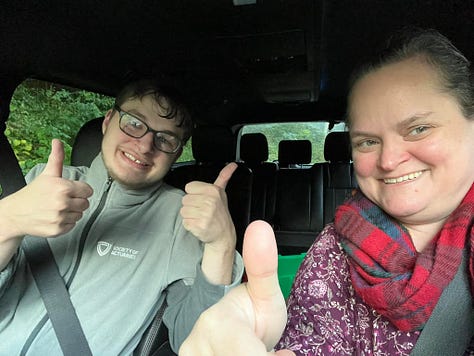
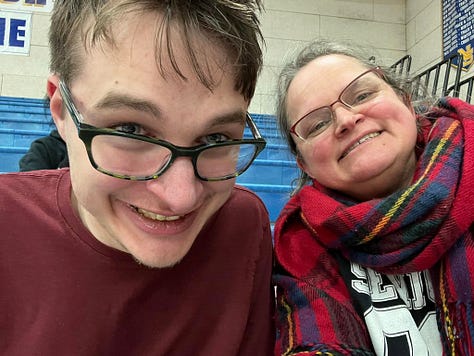
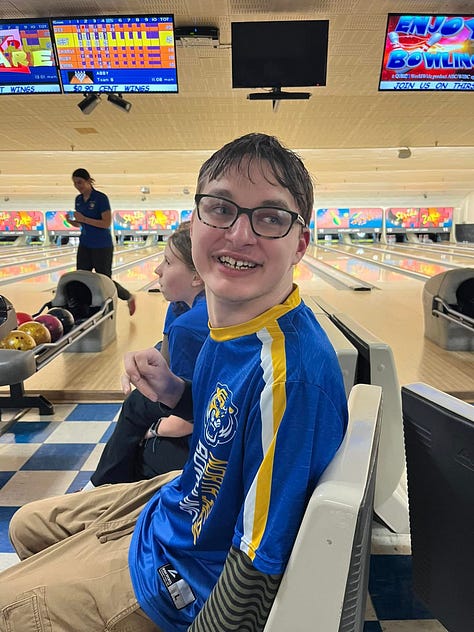

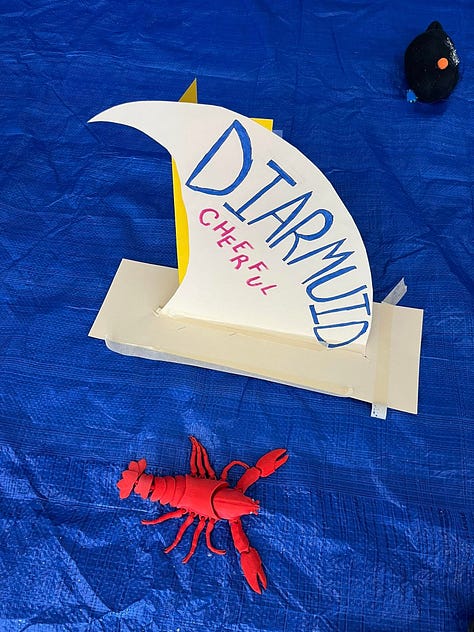
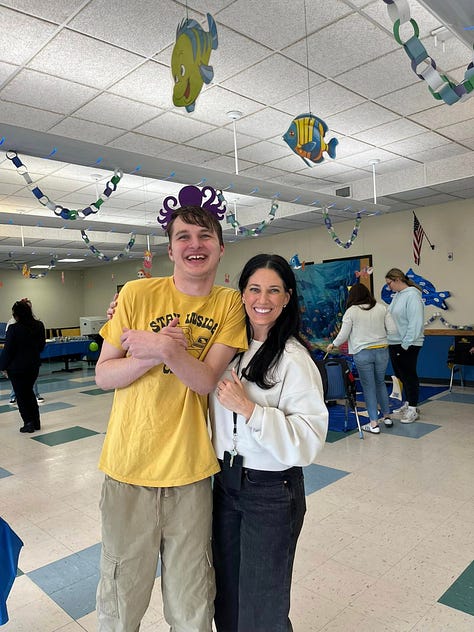
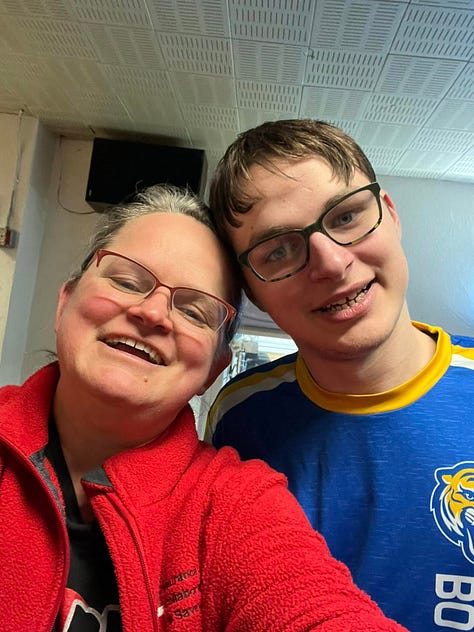

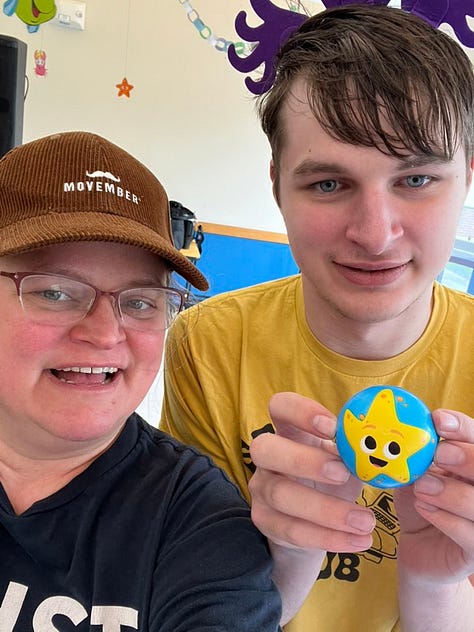
These are the happy pictures you see on Facebook, etc.
Above you can see Diarmuid in one of the adaptive sports - bowling - he’s done. He’s in adaptive basketball again. One of the pictures above is him with his special education teacher, and they have aides, and some of the other high school students also come in to interact with the students.
I think it’s a good program - these “buddies” - it’s not really friends, but it’s a chance for some of the students to consider potential careers in special education or therapy. I think it’s important to have some hands-on experience before investing a great amount of higher education (and $$) on a situation you find out is not fitting.
Because he’s in special education, D is allowed to stay in the local school system until he’s 21. I’m taking advantage of that, for sure. Maybe he’ll be able to transition to a job at that point. But it will more likely be a job for an aide, than for D, because given his current behavior, he always has to be accompanied by someone who is expert in getting him back on focus.
I don’t see him living independently of another adult’s supervision. The cognition level and behavioral control aren’t there.
He continues to show changes.
Yesterday, while I was plunging the toilet, he asked me what I was doing, so that was another advance. Usually, he doesn’t ask me what I’m up to.
With diet: he’s expanded to chicken fingers, beyond chicken nuggets, and evidently, he has learned to tolerate Chick-fil-A’s waffle fries and weird-looking nuggets. So that’s progress.
Perhaps there is another development going on now, which others have told me happened with their sons. Who knows. It is difficult to tell.
This is not a complaint - this is simply telling what others what it’s like, and only a small piece of it. Maybe one day Diarmuid will be able to tell his own story from his point of view.
Related posts/videos
Dec 2014: [video] Diarmuid does the school kindness announcement
Apr 2019: [video] Autism Awareness Month: Diarmuid’s Diagnosis
March 2014: Can Disney Films Teach Social Skills? - by Stu
Apr 2011: Autism Awareness Month and Diarmuid
Sept 2009: Breakthrough! - this is when we saw D feed himself
Aug 2009: Profile of the founder of D's school, and a few details




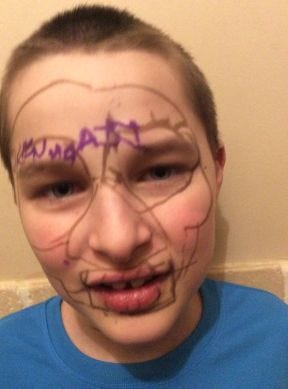
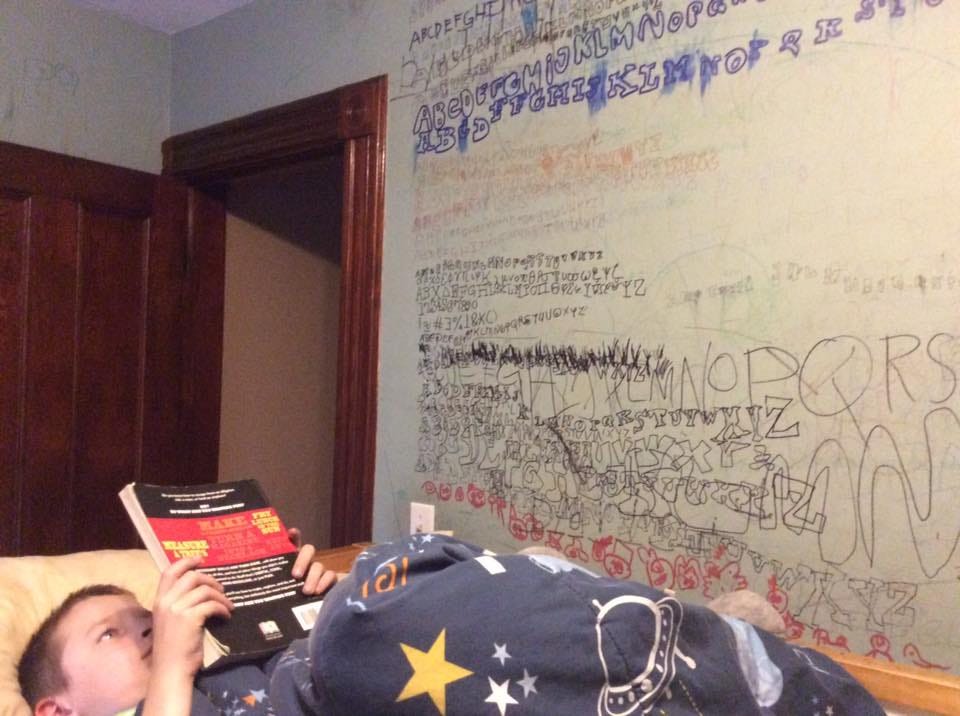
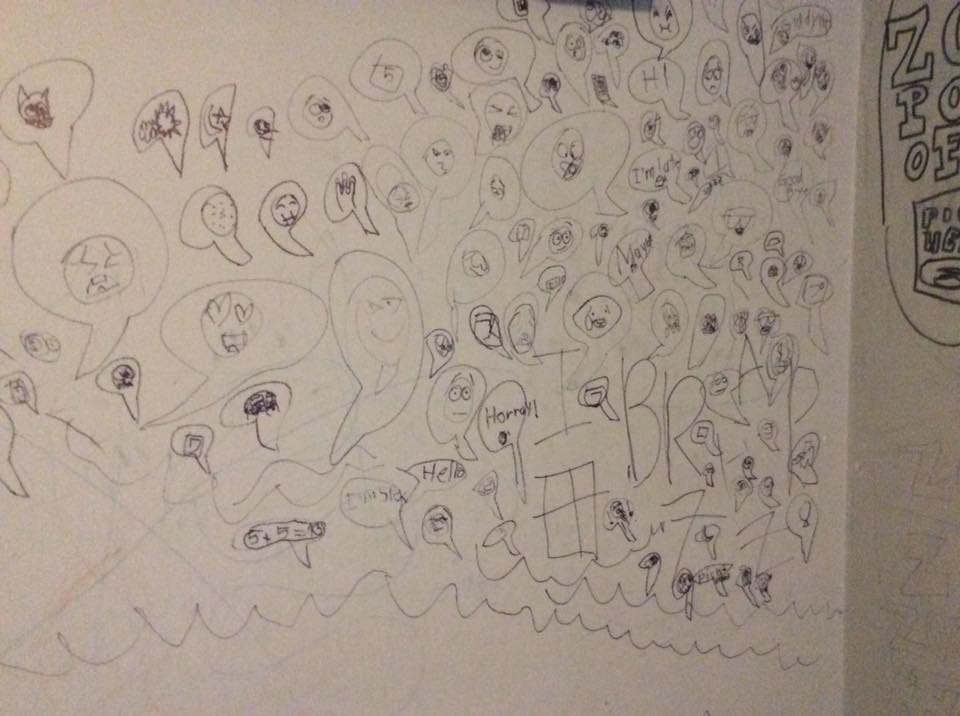
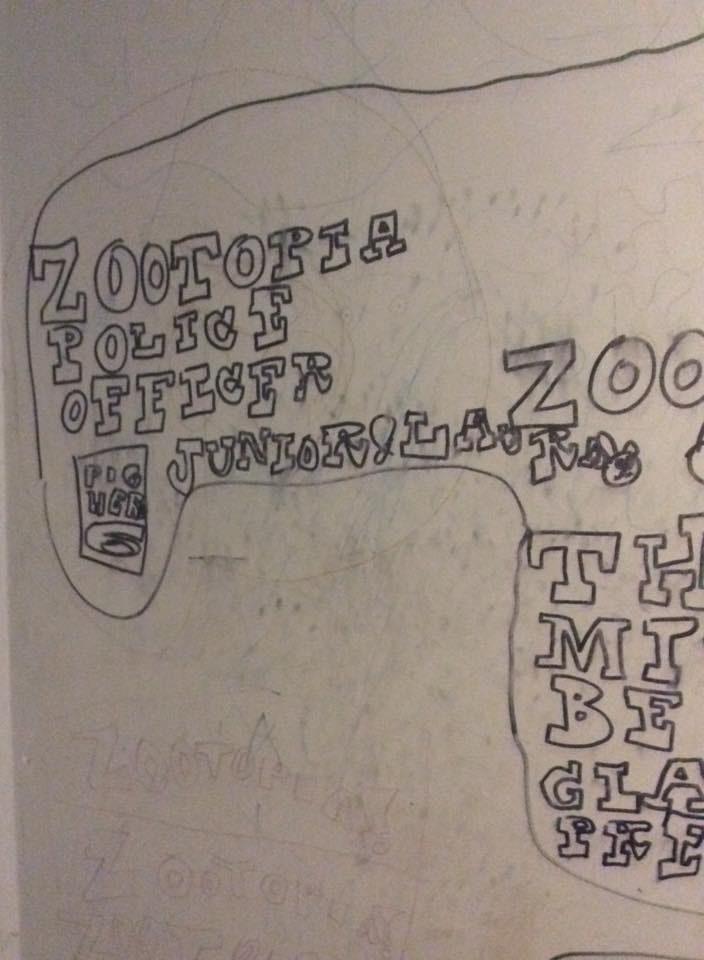
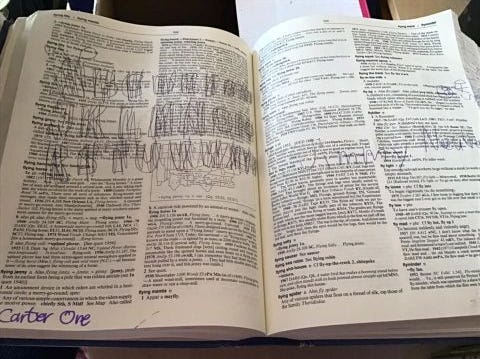
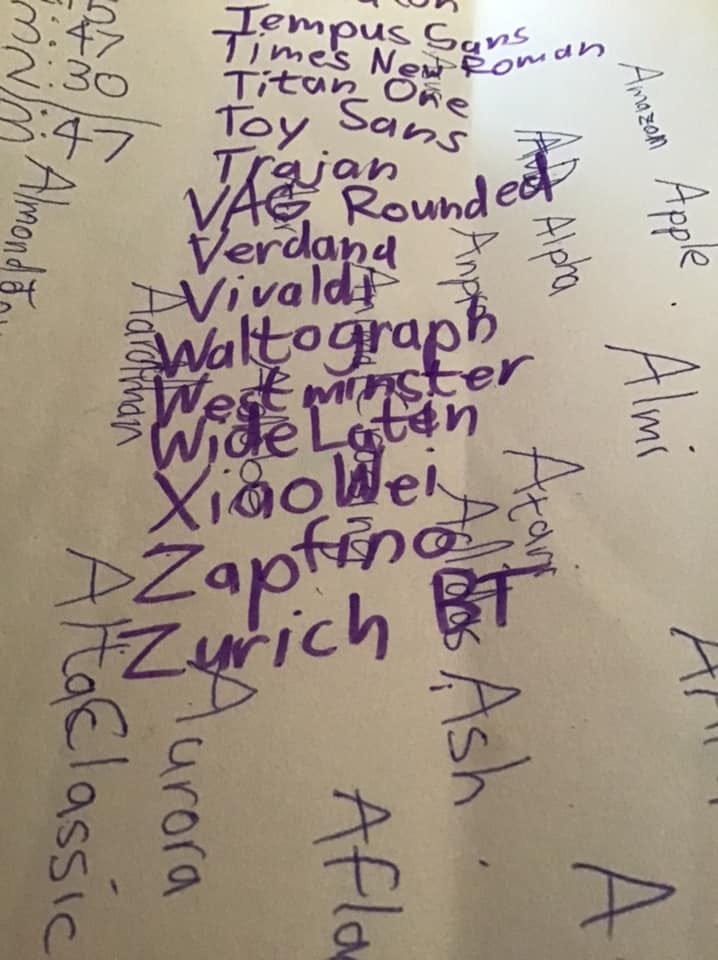




Thank you for sharing and educating!!
This evening, Diarmuid and I enjoyed:
Dr. Horrible's Sing-a-long blog:
https://youtu.be/Of9kHpCv1ts?si=3hVw9uR_wZBUW3MH
While we were watching this video, D often was flapping his hands, and jumping up and down.
That's the limit of what I will share.